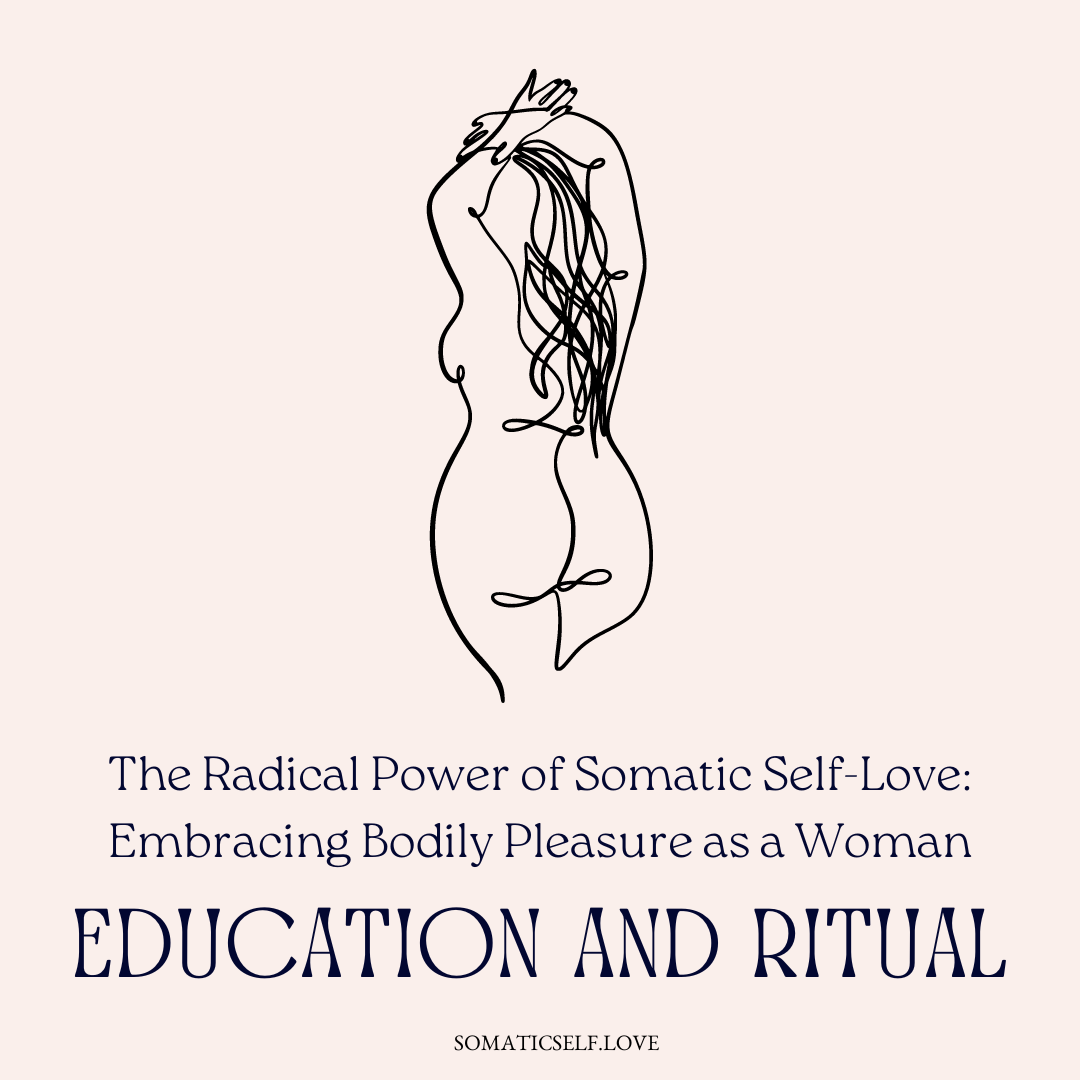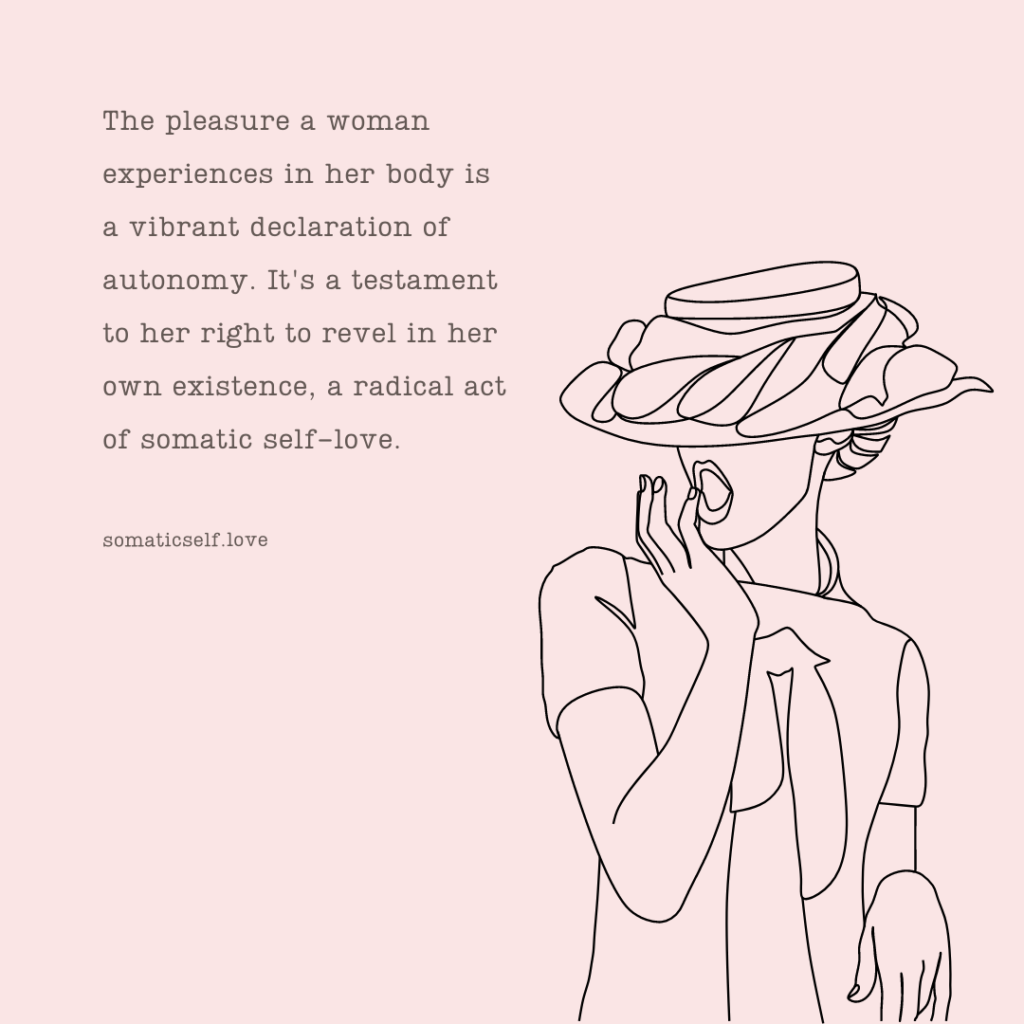The Radical Power of Somatic Self-Love: Embracing Bodily Pleasure as a Woman

We live in a world that often imposes stringent beauty standards and societal norms and when we as women take delight in our own bodies, it can be a radical act of autonomy. It is an act of self-love that goes beyond mere acceptance of the status quo, venturing into the realm of somatic sovereignty. Here we explore the empowering effects of embracing bodily pleasure as a woman, backed by research and culminating with a transformative somatic self-love ritual.
The Power of Pleasure
Pleasure is powerful. It boosts self-confidence, promotes a healthy body image, enhances emotional resilience, and fosters a deep sense of self-autonomy. A study published in the Journal of Health Psychology in 2019 found a significant link between positive body image and overall life satisfaction[^1^]. Similarly, research in the field of positive psychology has established a strong connection between pleasure, resilience, and well-being[^2^].

Societal expectations and norms play a significant role in how women perceive their bodies and their capacity to experience pleasure. These norms, often steeped in patriarchal values, can severely undermine the empowering potential of bodily pleasure.
Societal Norms and Body Image
Unfortunately, societal expectations often undermine the potential of pleasure as an empowering force. These norms can shape a woman’s perception of her body, creating a disconnect between her innate capacity for pleasure and her ability to access it.
A 2017 survey published in the International Journal of Eating Disorders revealed that societal beauty standards significantly impact women’s body image, often resulting in lower self-esteem and higher levels of body dissatisfaction[^3^].
Disarming Norms Through Pleasure
By taking delight in our body, we can disarm these years of societal expectations and norms. This act of pleasure becomes an act of rebellion, a radical shift towards somatic sovereignty. It empowers us as women to reclaim our body from the gaze of the outside world, to rewrite societal narratives, and to establish our own standards of beauty and worthiness.
A Ritual for 5 Senses Pleasure
Transitioning from understanding to embodied practice, let’s explore a somatic self-love ritual that can help women embrace their bodily pleasure:
- Create a Safe Space: Choose a quiet, comfortable space where you won’t be disturbed. Dim the lights or light candles to create a warm ambiance. Play gentle, soothing music.
- Ground Yourself: Sit or lie down comfortably. Close your eyes and take a few deep, intentional breaths. Visualize roots growing from your body into the Earth, grounding you.
- Perform a Body Scan: Slowly scan each part of your body, starting from your toes. Acknowledge any sensations or emotions that arise without judgment.
- Explore Your Senses: Focus on any sensations that arise. Instead of analyzing these sensations, just be with them. They are your body’s way of communicating with you.
- Express Yourself: Stand up and allow your body to move in any way it feels called to. Let this movement be spontaneous and liberating.
- Speak Affirmations: Sit down again, placing one hand over your heart and the other on your belly. Speak affirmations that resonate with you, such as “I honor the wisdom my body offers me.”
- Reflect and Journal: Write down any sensations, emotions, or insights that arose during the ritual. This is your body’s language, and journaling can help you decode its messages.
- Express Gratitude: Close your ritual by expressing gratitude to your body for its resilience, wisdom, and constant communication.
The pleasure a woman feels in her body is a radical act of reclaiming her narrative. It is a somatic statement of self-love, a powerful assertion of her body autonomy.
[^1^]: Body image and life satisfaction: the role of positive affect and self-esteem ↗
[^2^]: The Role of Positive Emotions in Positive Psychology ↗
[^3^]: Sociocultural vs. evolutionary or both? ↗